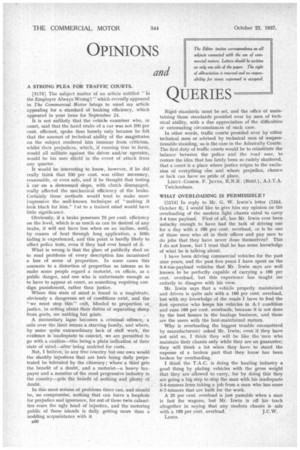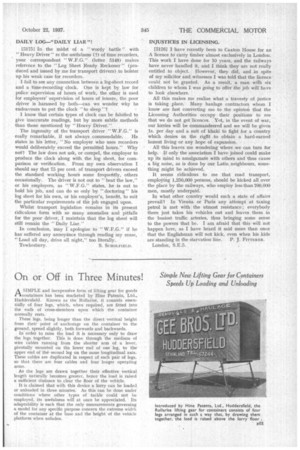OPINIONS
Page 82

Page 83

If you've noticed an error in this article please click here to report it so we can fix it.
and
QUERIES
A STRONG PLEA FOR TRAFFIC COURTS.
[5173] The subject matter of an article entitled "Is the Employer Always Wrong?" which recently appeared
in The Commercial Motor brings to mind my article appealing for a standard of braking efficiency, which appeared in your issue for September 24.
It is not unlikely that the vehicle examiner who, in court, said that the hand brake of a car was not 100 per cent. efficient, spoke thus loosely only because he felt that the amount of technical ability of the magistrates on the subject rendered him immune from criticism, whilst their prejudices, which,. if running true to form, would all militate against the driver and/or operator, would be his sure shield in the event of attack from any quarter.
It would be interesting to know, however, if he did really think that 100 per cent. was either necessary, reasonable, or even safe, and if he thought that testing i car on a downward slope, with clutch disengaged, really affected the mechanical efficiency of the brake.
Certainly these methods would tend to make more impressive the well-known technique of "making it look black for him." tut to a trained mind would have little significance.
Obviously, if a brake possesses 70 per cent. efficiency on the level, which is as much as can be desired of any
brake, it will not have less when on an incline, until, by reason of heat through long application, a little fading is eXperienced, and this point is hardly likely to affect police tests, even if they had ever heard of it.
What is wrong is that the glare of publicity shed on to road problems of every description has occasioned a loss of sense of proportion. In some cases this amounts to a distortion of proportion so intense as to make some people regard a motorist, ex officio, as a public danger, and one who is unfortunate enough as to have to appear at court, as something requiring condign punishment, rather than justice.
Where this state of mind is found in a magistrate, obviously a dangerous set of conditions exist, and the "we must stop this" cult, blinded to proportion or justice, in setting about their duties of separating sheep from goats, see nothing but goats.
A momentary lapse becomes a criminal offence, a mile over the limit means a starving family, and where,
by some quite extraordinary lack of staff work, the evidence is inadequate-to convict, we are permitted to go with a caution—this being a plain indication of their state of mind—after being mulcted for costs.
Not, I believe, many free country but-our own would the shoddy injustices that are here being daily perpe trated be tolerated by the citizenry ; where a thief gets the benefit of a doubt, and a motorist—a heavy taxpayer and a member of the most progressive industry in the country—gets the benefit of nothing and plenty of doubt.
In this most serious of problems there can, and should be, no compromise, nothing that can leave a loophole for prejudice and ignorance, for out of these twin calamities rears the ugly head of injustice, and the motoring public of these islands is daily getting more than a nodding acquaintance with it a60 Rigid standaxds must be set, and the office of maintaining those standards presided over by men of technical ability, with a due appreciation of the difficulties or extenuating circumstances of each case.
In other words, traffic courts presided over by either technical men or advised by technical men of unquestionable standing, as is the case in the Admiralty Courts. The first duty of traffic courts would be to reinstitute the balance between the police and the toad user, tcr restore the idea that has lately been so rudely shattered, that a court is a place where justice reigns to the exclusion of everything else and where prejudice, chance or luck can have no pride of place,
LIEUT.-COMDR. F. JEYES, R.N.R. (Retd.), A.1.T.A. Twickenham.
WHAT OVERLOADING IS PERMISSIBLE? [51741 In reply to Mr. G. W. Irwin's letter (5164. October 8), I would like to give him my opinion on the overloading of the modern light chassis rated to carry 3-4 tons payload. First of all, has Mr. Irwin ever been unlucky enough to have had the task of driving one for a day with a loo per cent, overload, or is he one of those men who sit in their offices and pay men to . do jobs that they have never done themselves? This I do not know, but I trast that he has some knowledge of what he is talking about.
I have been driving commercial vehicles for the past nine years, and the past five years I have spent on the 3-4-ton-payload vehicles that Mr. Irwin says are well known to be perfectly capable of carrying a 100 per cent, overload, but this experience has taught me entirely to disagree with his view.
Mr. Irwin says that a vehicle properly maintained and driven is quite safe with a 100 per cent, overload, but with my knowledge of the roads I have to find the first operator who keeps his vehicles in A.1 condition and runs 100 per cent, overloads, because it is not done by the best houses in the haulage business, and those are the users with the best-maintained motors.
Why is overloading the biggest trouble encountered by manufacturers? asked Mr. Irwin; even if they have not said so, think they will be like the 'men who maintain their chassis only while they are on guarantee; they will think a lot when they have to stand the expense of a broken part that they know has been broken by overloading.
I think the T.A.C. is doing the hauling industry a good thing by plating vehicles with the gross weight that they are allowed to carry, for by doing this they are going a big step to stop the man with his inadequate 3-4-tonners from taking a job from a man who has some 6-7-tonners that are built for the work.
A 25 per cent overload is just passable when a man is fast for wagons, but Mr. Irwin is off his track altogether in saying that any modern chassis is safe with a 100 per cent. overload. J.C.W. Lancs.
DAILY LOG—"DAILY LIAR"!
151751 In the midst of a " wordy battle" with "Heavy Driver" re the usefulness (?) of time recorders, your correspondent " W.F.G." (letter 5148) makes reference to the "Log Sheet Ready Reckoner" (produced and issued by me for transport drivers) to bolster up his weak case for recorders.
. I fail to see any connection between a log-sheet record and a time-recording clock. One is kept by law for police supervision of hours of work, the other is used for employers' supervision of hours of leisure, the poor driver is harassed by both—can we wonder why he endeavours to put the clock "to sleep "?
I know that certain types of clock can be falsified to give inaccurate readings, but by more subtle methods than those mentioned by "Heavy Driver."
The ingenuity of the transport driver " W.F.G." is really remarkable, if not always commendable. He states in his letter, " No employer who uses recorders would deliberately exceed the permitted hours." Why not? The law does not ask, or compel, the employer to produce the clock along with the log sheet, for com parison or verification. From my own observation I should say that 75 per cent, of transport drivers exceed the standard working hours some frequently, others occasionally. The driver is not out to "beat the law," or his employers, as " W.F.G." states, he is out to hold his job, and can do so only by " doctoring " his log sheet for his own, or his employer's, benefit, to suit the particular requirements of the job engaged upon.
Whilst transport legislation remains in its present ridiculous form with so many anomalies and pitfalls for the poor driver, I maintain that the log sheet will still remain the "Daily Liar."
In conclusion, may I apologize to " W.F.G." if he has suffered any annoyance through reading my muse, "Load all day, drive all night," too literally.
Tewkesbury. S. SCHOLFIELD. INJUSTICES IN LICENSING.
r511.8) I have recently been to Caxton House for an A licence to carry timber almost exclusively in London. This work I have done for 10 years, and the railways have never handled it, and I think they are not really entitled to object. However, they did, and in spite of my solicitor and witnesses I was told that the licence could not be granted. As a result, a man with six children to whom I was going to offer the job will have to look elsewhere, All this makes me realize what a travesty of justice is taking place. Many haulage contractors whom I know are fast converting me to the opinion that the Licensing Authorities occupy their positions to see that we do not get licences. Yet, in the event of war, our lorries will be commandeered and we will be given .1s. per day and a suit of khaki to fight for a country which denies us the right to obtain a hard-earned honest living or any hope of expansion.
All this leaves me wondering where we can turn for help. If only the association I have joined could make up its mind to amalgamate with others and thus cause a big noise, as is done by our Latin neighbours, something might be achieved.
It seems ridiculous to me that road transport, employing 1,250,000 persons, should be kicked all over the place by the railways, who employ less than 700,000 men, mostly underpaid.
In what other country would such a state of affairs prevail? In Vienna or Paris any attempt at taxing petrol is met with the utmost resistance; everybody there just takes his vehicles out and leaves them in the busiest traffic arteries, thus bringing some sense to the powers that be. I am afraid that this will not happen here, as I have heard it said more than once that the Englishman will not kick, even when his kids are standing in the starvation line. P. J. FITTERER.
London, S.E.5.
























































































































